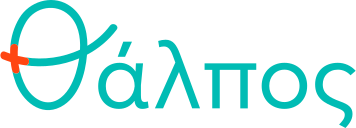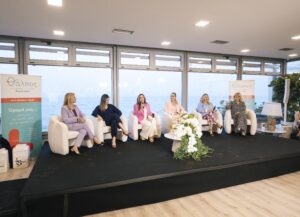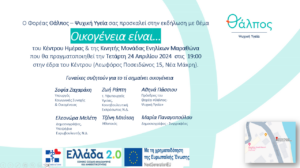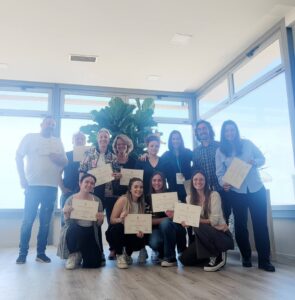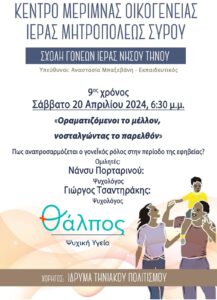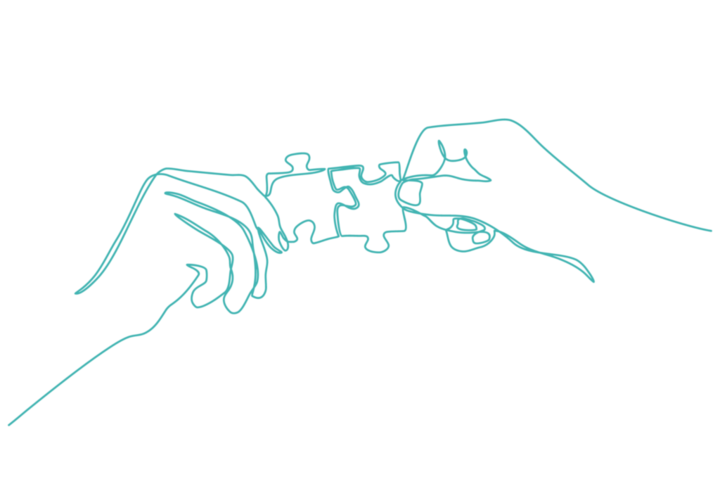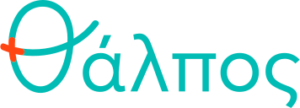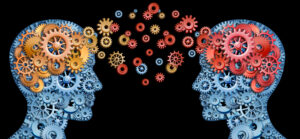
According to the World Health Organization (2001), mental health is defined as a positive state that enables the individual to manage effectively and creatively the aspects of his or her daily life - such as family, work, education, interpersonal relationships and the social environment. As such a condition is not only about the needs arising from mental illness, but more about a dialectical relationship between the self and the surrounding world, which concerns the way in which the individual thinks, communicates and develops.
The purpose of the Day Centre is to provide therapeutic care and enhance the psychosocial rehabilitation of adults with mental disorders and psychosocial problems in the community.
Our central objectives are to offer the recipients of mental health services a pathway to conquer their mental health, autonomy and identity through a therapeutic process, in order to maintain their connection with their family and social environment and to achieve a stay or return to a normal life and employment condition.
The individual objectives pursued through the operation of the Day Centre are:
- Preventing relapse and avoiding psychiatric hospitalisation
- The provision of personalised care plans
- Improving the quality of life of the beneficiaries and their integration into social life
- Improving the self-image of the beneficiaries in order to prevent marginalisation and social isolation
- Discharging the family/supportive context of the beneficiaries by acting in a supportive and counselling capacity
- The interconnection with the other Mental Health Units of the intervention area
- Raising community awareness to eliminate stigma and defend and strengthen the rights of people with mental illness
The Day Centre is addressed to adults with mental disorders and psychosocial problems. In particular, potential direct beneficiaries of the Day Centre's services are:
- Adults suffering from mental disorders/psychosocial problems, such as psychotic disorders, mood disorders, personality disorders, anxiety disorders, post-traumatic stress disorders
- Adults who have a chronic physical illness that clearly affects their mental and social life, such as cancers - malignant neoplasms, autoimmune diseases, chronic metabolic disorders, chronic pain
- Adults belonging to vulnerable groups and experiencing or at risk of social exclusion
It is noted that services cannot be provided to adults with acute psychiatric symptoms, moderate or severe mental retardation, severe autistic symptoms, drug addictions, high levels of delinquent behaviour.
The operation of the Day Centre may benefit the family/supportive context of the beneficiaries, the wider community of the intervention area (residents, local authorities and social institutions, etc.), mental health institutions and professionals, etc.
The Institution cooperates for the Day Centre with the General Hospital of Attica "Sismanoglio" and the Society of Social Psychiatry P. Sakellaropoulos, in order to offer scientific experience, supervision and know-how for the organization and operation of the services of the Day Centre.
Reception services
- Secretarial Support & Information Provision
- Reception and transmission of requests
- Monitoring & managing meetings
Psychological services
- Needs assessment, conducting psychometric tests
- Development and implementation of personalised care and support plans
- Therapeutic interventions (counselling support for the empowerment and strengthening of the mental resilience of children and adolescents, individual therapeutic intervention for children, adolescents and parents facing mental disorders)
- Therapeutic groups (family and school support groups, specialised programmes such as therapeutic exercise, arts therapies)
- Systematic monitoring (follow-up)
Psychiatric services
- Diagnostic assessment and needs assessment
- Development and implementation of personalised care and support plans
- Therapeutic intervention
- Systematic psychiatric medical monitoring (follow-up)
Social service
- Reception, organisation and management of requests
- Social needs assessment
- Information and support on social-welfare issues
- Operation of the referral protocol
- Organisation and operation of groups of interconnected actors
- Advisory support
Nursing services
- Primary health care services
- Nursing operations (taking vital signs, individual health promotion)
- Adherence to medication
- Depot Clinic - Long-acting injectables clinic
Psychosocial rehabilitation activities
- Groups of varied activities with a fixed and changing subject matter
- Excursions, exchange visits with relevant mental health agencies
- Leisure activities
Community education actions
- Networking and cooperation with services/bodies
- Conducting workshops, events, communication campaigns
- Development of methodological tools, guidelines and dissemination of good practices
- Mental health prevention & promotion groups
Specialised mental health services
- Therapy assisted by virtual & augmented reality tools
- Operation of specially designed spaces for the discharge, relaxation and activation of the beneficiaries
- Digital Services - information & psycho-education platform
Training & empowerment of professionals
- Evaluation of services provided (internal and external)
- Operation of an employee group for the prevention of burnout, communication and conflict management
- Theoretical-clinical training of employees (in-service training)
- Conducting exchange visits with professionals from other institutions
The Day Centre for Family Support is implemented within the framework of the National Recovery and Resilience Plan Greece 2.0 with funding from the European Union - NextGenerationEU.

Contact details
Address: 15 Poseidonos Avenue, Nea Makri - D. Marathonos
Phone 1: 229 40 96 939
Phone 2: 694 90 77 005
Email: community@thalpos.org.gr

Contact details
Address: 15 Poseidonos Avenue, Nea Makri - D. Marathonos
Phone 1: 229 40 96 939
Phone 2: 694 90 77 005
Email: community@thalpos.org.gr
